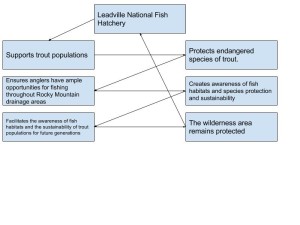- In 150-200 words, describe an area that’s protected by an international conservation organization and the importance of the protection that is provided. What would have happened to it if it had not been protected? What does the future hold for the site?
- In your own words, what do you think will come of the human species in one thousand years? Will we still be on Earth? Will we have spread to other solar systems? How will maintaining bio diversity, sustainable development, on the planet affect our survival?
- Using a system diagram, illustrate the effects that the area has on bio diversity and sustainability.
In central Colorado there are 30,540 acres of mountainous forest called Mount Massive Wilderness Area. The IUCN classifies it as ‘Ib’, which means it’s protected to ensure that biodiversity and other natural functions of the ecosystem can flourish[1]. Human presence is heavily restricted, and ‘leave no trace (pack it in/pack it out) practices are enforced. It designated a wilderness area in 1980 by congress and has been managed by the Fish and Wildlife Service and Forest Service ever since. The Leadville national fish hatchery is located within the boundaries of the area and serves to rear several different species of trout to ensure populations of remain sustainable in the rocky mountain area. Without services like this, humans would’ve fished the rivers dry of trout and many of these species would’ve most likely gone extinct. Instead, because of the hatcheries, sportsman can enjoy fishing while the population stays sustainable. As long as current practices are enforced into the future, and barring any natural disaster, this wilderness area will remain pristine for many generations to come.
The human species has proven itself to be an extremely dominant life form. Though we are still relatively new to the planet, we are amazingly adaptable and durable. We exist in every climate. We have a presence on every major body of land. We even maintain a human presence that orbits the planet. We have survived extreme natural disasters, extinctions, famine, plagues, pandemics, wars, etc. Every test that has been thrown at us since the dawn of our existence has been survived. Even with everything that was against us, we’ve flourished to the point of overpopulation that’s depleting our natural resources and polluting our environment. Our biggest hurdle in our evolution is proving to be ourselves. I truly believe that we can and will overcome the challenges us. Collective action will take hold when the effects of climate change become apparent to all. We will apply sustainable ethics to our thought processes and develop appropriate methods of living. We will ensure our own bio diversity as well as our environment’s because without it we won’t be able to survive here long enough to develop the knowledge and means to survive on other worlds. In 1,000 years, I think that we will have learned to live off the planet and will leave this solar system in search of other habitable places for the continued growth of our species.
[1] (wikipedia/ IUCN protected area categories 2016)


Taylor,
I enjoyed your choice of assignment. I thought the second section about where human civilization will be in 1,000 years was interesting. Your section on Mount Massive Wilderness Area was very interesting, I truly enjoy the outdoors and everything it offers so reading about how we are taking steps to preserve areas like this is very encouraging.
When you spoke about how humans will change their ways once everyone realizes climate change is an issue raised some concerns with me. The main thing I am concerned with is, what if the majority of humanity realizes, too late, that we need to take action? What happens if we choose not to act, act too late or do not provide enough action and we destroy the planet beyond its recovery point? That scares me.
If you are interested I wrote a piece that you can find here: http://sites.psu.edu/geog30/2016/04/15/a-little-goes-a-long-way/
Hi my name is Eric. Your post caught my attention because I love to fish and I like how the trout population is being protected. I also like how you included a system diagram. The diagram helped to show how the hatchery protects the trout. In my post, I talked about the deforestation of the Amazon Rainforest, but I did enjoy reading about the protection of the fish.
http://geog030.dutton.psu.edu/2016/04/15/module-10-8/